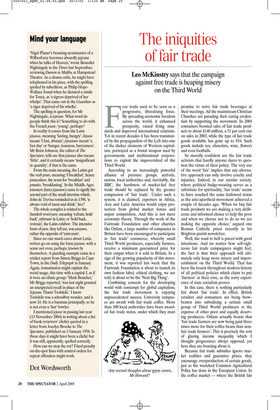Mind your language
‘Nigel Planer’s beaming scoutmaster of a Wilberforce becomes absurdly jejeune when he talks of Heaven,’ wrote Benedict Nightingale in the Times last September, reviewing Darwin in Malibu at Hampstead Theatre. As a drama critic, he might have telephoned in his piece, with the spelling spoiled by subeditors, as Philip HopeWallace found when he dictated a simile for Tosca, as ‘a tigress deprived of her whelps’. That came out in the Guardian as ‘a tiger deprived of his whelks’.
The spelling in question, for Mr Nightingale, is jejeune. What word do people think this is? Something to do with the French jeune, ‘young’, perhaps?
In reality it comes from the Latin jejunus, meaning ‘fasting, hungry’. Jejuno meant ‘I fast, abstain’; jejunium meant ‘a fast day’ or ‘hunger, leanness, barrenness’. Mr Boris Johnson, the editor of The Spectator, tells me that jejunus also means ‘little’, and it certainly means ‘insignificant in quantity’, if that is the same.
From the main meaning, the Latins got the verb jento, meaning ‘I breakfast’, hence jentaculum, the noun for ‘breakfast’ and jentatio, ‘breakfasting’. In the Middle Ages ieiunium (later jejunum) came to signify the second part of the small intestine which, John de Trevisa reminded us in 1398, ‘is always void of meat and drink’. See?
The whole complex is related to the Sanskrit word yam, meaning ‘refrain, hold back’, refrenare in Latin; or ‘hold back, restrain’, the Latin cohibere. The intensive form of yam, they tell me, was yanyam, rather the opposite of ‘yum-yum’.
Since no one much cares about Latin, writers go on using the form jejeune, with a sense not even, perhaps, known by themselves. A puzzling example came in a cricket report from Simon Briggs in Cape Town, in the Daily Telegraph in January. Again, transmission might explain the weird usage, this time with a capital J, as if it were an ethnic group: ‘Mark Boucher,’ Mr Briggs reported, ‘was last night granted an unexpected recall in place of the Jejeune Thami Tsolekile.’ I know Tsolekile was a schoolboy wonder, and is now 24. He is a batsman principally, so he is not even a ‘fast’ bowler.
I mentioned jejune in passing last year (13 November 2004) in writing about a list of book reviewers’ clichés quoted in a letter from Jocelyn Brooke to The Spectator, published on 3 January 1958. In those days it might have been a cliché but it was still, apparently, spelled correctly.
How can we stop the rot? Fixed-penalty on-the-spot fines with control orders for repeat offenders might work.





























































 Previous page
Previous page